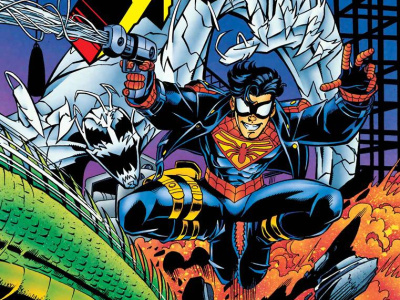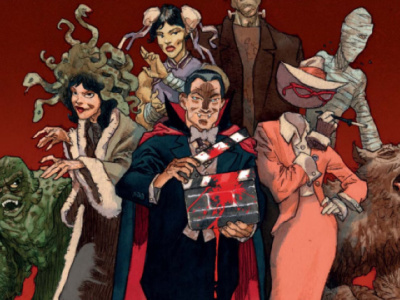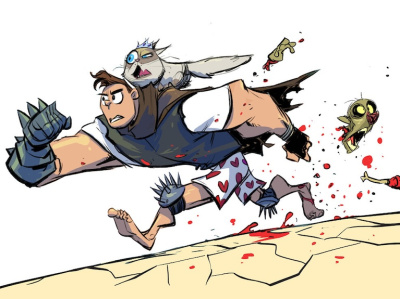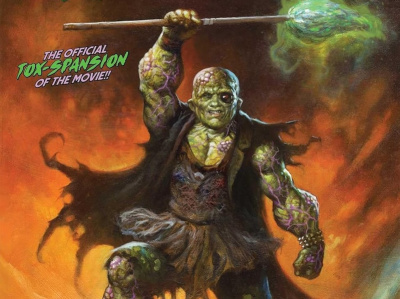In the spring of 2002, Brian Hibbs of Comix Experience in San Francisco brought a class action suit against Marvel on behalf of comic book retailers (see 'Retailer Class Action Lawsuit Filed Against Marvel') when Marvel refused to accept returns on books that shipped late and books with last minute creator changes. After a court-ordered arbitration, a settlement has been worked out, and ICv2 queried Hibbs about the suit, which affects every retailer who ordered Marvels. Hibbs prefaced his answers with a disclaimer:
Hibbs: 'Let's start off with the perhaps obvious, but probably necessary statement that I AM NOT A LAWYER.
While I'm closer to the suit that any other retailer, my understanding of law, and New York State law in particular, is passing at best. My terminology may not be exact. In fact, it is entirely possible that I may absolutely and 100% misrepresent some fact or circumstance in my ignorance of the law. And, I'd say it is beyond possible and all the way to certain that I'm going to get some legal term or phrasing wrong. Lawyers just use the language differently than we normal humans!
I strongly, and in no uncertain terms, urge every retailer to not only read carefully through the Proposed Settlement document when they receive it, but to engage a lawyer to read it over on their behalf as well. Lawyers know the law -- I just know what my gut tells me is ethical and fair.'
ICv2: What is the status of the settlement?
Hibbs: Again in my non-lawyerly way, my understanding is that my representation and Marvel, with the aid of a court-approved mediator, have come up with a proposed settlement that both sides can live with. All that's left is for the Judge to sign off on it.
I've never spoken to the Judge, and all I have is second-hand reports, but from what I've been able to suss out, it strikes me that the man is very concerned with making sure that the class is properly protected. If I understood what I was told correctly, he even asked for some more-favorable-to-us terms from our original proposal to him.
The Judge has allowed us to notify retailers that the proposed settlement is ready, so that they can have some say in it. I think this means that the Judge is going to be VERY interested in what retailers have to say, pro and con, after they see the settlement for themselves.
I personally tend to suspect that the overwhelming majority of retailers are going to think this fair, but I'm glad that everyone'll be able to look over it in advance, and that the Judge will have access to a wide variety of opinions.'
Does it have to be approved by all retailers who ordered Marvels during the period designated in the suit?
The way it is meant to be structured is as an 'opt out', so retailers are automatically assumed to be a part of the suit (and, therefore, to have approved of it) unless they remove themselves. Despite this, I still really encourage every retailer who supports this, once they see all the exact language of the proposal, to write a letter to the Judge, expressing that support. An ACTIVE support is always better than a passive one.
When will retailers get a chance to vote on the proposal?
It's up to Marvel to actually 'notify' the class -- to send out the Proposed Settlement documents and the list of affected titles, and whatnot. They've got until, I think, March 10th, to get that out, though they could also send it next week in theory.
I'm hoping for sooner, obviously, but it isn't up to me.
If the settlement is approved, how much will Marvel have to pay out in credits to retailers?
When the Proposed Settlement documents go out, I believe it will include a list of every affected title, and an individual accounting of what would then be due to a particular retailer. As far as absolute values go, I think I'll defer to the documents that will get to retailers soon, but I can say that well over 150 books are now involved, up quite a bit from the list of items Marvel made returnable after the suit was filed.
You never know who'll opt out, but if 100% of retailers claim 100% of the credit, I believe that at least $1.5 million dollars will be reinjected directly to the retail community.
Will there be a difference in the amount of credit issued for late books versus books with creator changes?
It's 24% for late books, and 17.5% for 'different' ones.
How were the percentages arrived at?
Negotiation!
I'm not sure exactly how large a factor it played in it, or if it did how exactly they calculated the impact, but both sides had access to my cycle sheets. One of the reasons this suit was able to go forward so cleanly was that I had the data to show something that ever retailer knows: when you ship books late, they usually sell less copies.
So, really, let this be a lesson to every retailer: if for no other reason, collect and keep that cycle sheet data! Hell, I do mine by hand, so it's not like it's that hard to do. You never know when you might need it!'
Will retailers have to go back and find out exactly what they ordered to calculate their credits?
Nope!
That information is supposed to be provided directly to each account, and everyone will have the opportunity to compare it to their own records and make sure the totals are correct, if they so wish.
What happens to retailers who have gone out of business or are out of terms with Marvel or Diamond?
Two different questions, so let's go to the easy one first: if you are out of terms with Marvel, credits apply to whatever balance you owe first. That's fair, I think.
As I understand it, this is purely Marvel credit, so being out of terms with Diamond doesn't enter in to it. If a retailer IS out of terms with them, however, I'd be extra diligent in confirming all credits are applied solely to Marvel comics. Not because I suspect anything will go wrong (far from it), but because an extra set of eyes on a process is never a bad thing. I'd do it, but I'm not in debt...
As for out-of-business retailers, Marvel has to make every reasonable effort to contact them. They'll be given a voucher that can be freely traded to any current retailer. My hope is that we'll be able to independently set up an in-industry clearinghouse of retailers who would be willing to pay 100% of face-value for vouchers in cash. I don't really know how many people we're talking about here, but I would think any vouchers could quickly be absorbed by current accounts as Marvel accounts for a significant percentage of most stores.
And, by and large in our industry, most out-of-business accounts go that way sticking their debt to the distributor. Heck, Tom, you and Milton know that one first hand!'
How satisfied are you with the settlement?
All settlements are a process of compromise, but I think this is balanced and fair.
There were things I wanted and didn't get (Like, I wanted $100,000 donated to the Comic Book Legal Defense Fund -- I'm going to settle with donating 20% of my personal reward from this), but then there were things that Marvel wanted, but didn't get, so it's balanced.
Still, my satisfaction is really secondary to what working retailers think of it. I'll be satisfied if 0% of retailers opt out.
Did you ever have second thoughts about the costs involved in taking on a large corporation (with all its legal resources) even though you had a very strong case?
No, not really -- I knew the merits of the case would bear out. It really couldn't have been more clear-cut.
The worst part of all of this is really that it needn't have happened in the first place. Multiple attempts to reconcile this were made by many retailers before it became a suit. All were rebuffed.
But, ultimately, this has all been worth it, and not just because of the settlement, but because I believe we've been able to change Marvel's behavior. The change in the terms of sale to switch to the FOC ordering system is, I think, a direct result of the suit (and a very positive one at that), but, more importantly, Marvel has been trying to provide us with better and more accurate information lately, treating us more like the partners we are. That was the goal all along, and I've very pleased how things have worked out.







